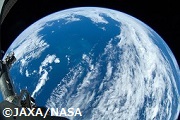| タイトル | Astrobiology Sample Analysis Program (ASAP) for Advanced Life Detection Instrumentation Development and Calibration |
| 著者(英) | Bada, Jeff; Glavin, Daniel; Brinkerhoff, Will; Mathies, Rich; Amashukeli, Xenia; Stern, Jen; Aubrey, Andrew; Fisher, Anita; Blake, Daid; Grunthaner, Frank; Fries, marc; Chiesl, Tom; Franz, Heather; Mahaffy, Paul; Sandford, Scott; Dworkin, Jason; Eigenbrode, Jennifer; Steele, Andrew; Stockton, Amanda |
| 著者所属(英) | NASA Goddard Space Flight Center |
| 発行日 | 2008-04-14 |
| 言語 | eng |
| 内容記述 | Scientific ground-truth measurements for near-term Mars missions, such as the 2009 Mars Science Laboratory (MSL) mission, are essential for validating current in situ flight instrumentation and for the development of advanced instrumentation technologies for life-detection missions over the next decade. The NASA Astrobiology Institute (NAI) has recently funded a consortium of researchers called the Astrobiology Sample Analysis Program (ASAP) to analyze an identical set of homogenized martian analog materials in a "round-robin" style using both state-of-the-art laboratory techniques as well as in-situ flight instrumentation including the SAM gas chromatograph mass spectrometer and CHEMIN X-ray diffraction/fluorescence instruments on MSL and the Urey and MOMA organic analyzer instruments under development for the 2013 ExoMars missions. The analog samples studied included an Atacama Desert soil from Chile, the Murchison meteorite, a gypsum sample from the 2007 AMASE Mars analog site, jarosite from Panoche Valley, CA, a hydrothermal sample from Rio Tinto, Spain, and a "blind" sample collected during the 2007 MSL slow-motion field test in New Mexico. Each sample was distributed to the team for analysis to: (1) determine the nature and inventory of organic compounds, (2) measure the bulk carbon and nitrogen isotopic composition, (3) investigate elemental abundances, mineralogy and matrix, and (4) search for biological activity. The experimental results obtained from the ASAP Mars analog research consortium will be used to build a framework for understanding the biogeochemistry of martian analogs, help calibrate current spaceflight instrumentation, and enhance the scientific return from upcoming missions. |
| NASA分類 | Lunar and Planetary Science and Exploration |
| 権利 | Copyright |
|

